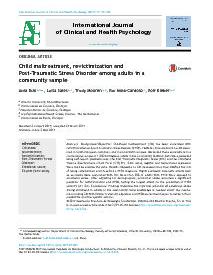Child maltreatment, revictimization and Post-Traumatic Stress Disorder among adults in a community sample
Background/Objective: Childhood maltreatment (CM) has been associated with revictimization and post-traumatic stress disorder (PTSD). However, this relation is hardly examined in South European countries, and in community samples. We tested these associations in a convenience sample of 1,200 Portuguese adults in the community. Method: Data were collected using self-report questionnaires, the Post Traumatic Diagnostic Scale (PDS) and the Childhood Trauma Questionnaire–Short Form (CTQ-SF). Odds ratios, logistic and hierarchical regression were used to analyze the data. Results: Exposure to CM increased more than twofold the risk of being revictimized and threefold a PTSD diagnosis. Highly prevalent traumatic events such as accidents were associated with CM. More than 30% of adults with PTSD were exposed to emotional abuse. After adjusting for demographics, emotional abuse remained a significant predictor for revictimization and PTSD, having the largest effect on the prediction of PTSD severity (β = .24). Conclusions: Findings underline the injurious potential of emotional abuse during childhood in adults in the community. More knowledge is needed about the mechanisms linking CM with further traumatic exposure and PTSD across the lifespan to better inform preventive and therapeutic actions.
In: International Journal of Clinical and Health Psychology, ISSN 1697-2600 | 17 | 2 | Mat-August | 97-106
https://doi.org/10.1016/j.ijchp.2017.03.003


